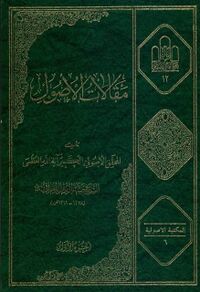Diya al-Din al-Iraqi, a prominent figure in Shia Islamic thought, is revered not only for his scholarly contributions but also for his profound understanding of the philosophical and theological underpinnings of Shia Islam. His teachings encapsulate intricate ideas that address the metaphysical foundations of belief, the nature of divine guidance, and the importance of imamate within the Shia tradition. This article delves into the diverse aspects of al-Iraqi's teachings, offering a comprehensive exploration of his intellectual legacy, his methodological approach, and the implications of his work for contemporary Shia thought.
One of the salient features of al-Iraqi's teachings is his emphasis on the meticulous methodology that underlies Shia scholarship. In an era characterized by theological fragmentation, he advocates a systematic approach to understanding religious texts. His discourse reveals a profound commitment to the principles of logic and rationality. Al-Iraqi posits that faith must not only be rooted in tradition but also engage critically with reason. This philosophical stance challenges readers to navigate the complexities of belief, urging them to harmonize fervent faith with intellectual rigor.
The notion of Imamate, the leadership of the Muslim community through divinely appointed leaders, is a cornerstone of al-Iraqi's work. He articulates the necessity of recognizing the Imams as intermediaries between God and humanity. According to al-Iraqi, the Imams possess an unparalleled esoteric knowledge that equips them to interpret the divine will accurately. This perspective serves to fortify the spiritual authority of the Imams in the eyes of believers, thereby reinforcing the theological legitimacy of the Shia tradition. Readers engaging with al-Iraqi’s teachings will find a robust argumentation for the principle of Imamate, bolstered by historical narratives and textual evidence.
Moreover, al-Iraqi’s philosophical inquiries extend to the nature of God and the divine attributes. He meticulously examines concepts such as oneness (tawhid) and the divine will. In his analysis, he delineates the multifaceted dimensions of tawhid, integrating metaphysical propositions with ethical considerations. This exploration reveals an interconnectedness between divine attributes and human moral responsibilities. Al-Iraqi contends that a profound comprehension of divine qualities engenders a transformative impact on the believer's ethical stance, fostering a deeper commitment to justice and virtue.
Another crucial aspect of al-Iraqi's teachings lies in his exploration of epistemology within a Shia framework. He delves into the means by which knowledge is acquired, scrutinizing the interplay between rational thought and divine revelation. His works highlight the limitations of human cognition while simultaneously acknowledging the essential role of prophetic teachings. Al-Iraqi argues that while reason is indispensable in the quest for knowledge, it must be complemented by a firm adherence to traditions passed down through the Imams. This synthesis of rationalism and tradition presents a nuanced understanding of knowledge acquisition that is particularly relevant for scholars and students of theology.
Al-Iraqi’s writings also reflect a profound engagement with the socio-political dimensions of Islamic life. He is acutely aware of the challenges faced by the Shia community throughout history, particularly in contexts of persecution and marginalization. His teachings advocate for a dignified resistance grounded in ethical principles and wisdom. Al-Iraqi emphasizes the importance of maintaining a constructive relationship with society at large, leveraging dialogue and understanding to foster coexistence. This dimension of his thought resonates profoundly in contemporary discussions surrounding interfaith relations and communal harmony.
Furthermore, Diya al-Din al-Iraqi's influence is evident in the realm of theological disputes. His adeptness in refuting opposing views, particularly from the Sunni tradition, underscores his commitment to articulating Shia doctrines clearly and convincingly. He navigates complex theological arguments with finesse, often employing a dialectical approach that invites engagement rather than alienation. His capacity for addressing contentious issues without compromising the integrity of his beliefs exemplifies a model of constructive discourse that remains pertinent today.
To understand the contemporary implications of al-Iraqi's teachings, it is essential to consider his legacy in modern Shia thought. The resurgence of Shia scholarship in recent years has drawn heavily on the foundational works established by scholars like al-Iraqi. His emphasis on intellectual engagement, ethical considerations, and the vitality of Imamate continues to inspire new generations of scholars. Readers can anticipate an in-depth analysis of how his theological frameworks can be applied to address contemporary issues, including those related to identity, governance, and societal ethics.
In conclusion, Diya al-Din al-Iraqi emerges as a paramount figure in the landscape of Shia thought, embodying a profound intellectual tradition that balances faith with reason. His teachings offer a rich tapestry of insights that are both historically rooted and profoundly modern in their relevance. Engaging with al-Iraqi’s works fosters a nuanced appreciation for the Shia tradition and encourages a continued quest for knowledge, understanding, and ethical engagement within the broader Islamic discourse. For students, scholars, and adherents alike, the teachings of Diya al-Din al-Iraqi stand as an enduring testament to the profound depth and dynamism of Shia intellectual heritage.


